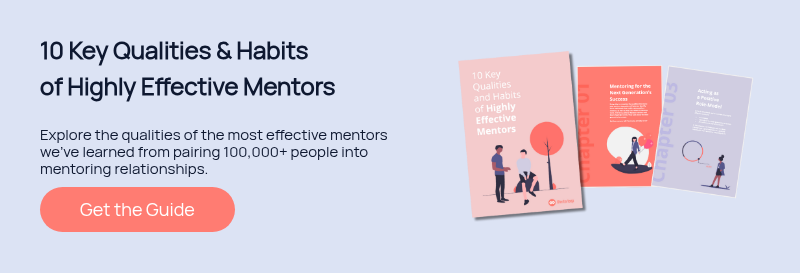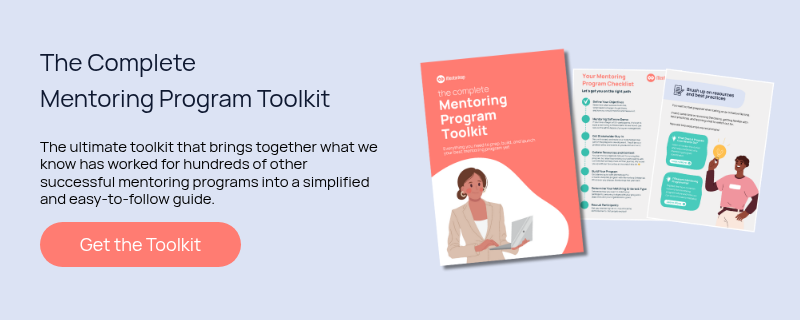When we mused about starting Mentorloop many years ago, it was on the basic premise of making mentoring more accessible to more people.
How do we help people connect with that future version of themselves?
For me personally, I’d been okay at building what I would refer to now as a career network – people I crossed paths with in a professional context which generally took place at work or networking events. I nurtured these relationships and while I didn’t know it at the time, built a network of mentors I could turn to for advice to help me navigate my career.
But when I stepped out of the corporate world and started my first business, I realised I was alone.
It’s not to say those connections were now redundant. They just weren’t representative of the type of advice I needed at that point in time. I needed to talk to other founders, people that had walked the path I was about to – but where to start? It was in a way this personal experience that helped Mentorloop come to life.
Now we are further into the journey, I still proactively seek mentors and am happy to share my experience if I think I have something of value to offer.
You don’t ever outgrow mentoring
But I think there are some people that master the art of mentoring – that is, identifying, asking and maintaining the relationship, building a personal advisory board you can call on when and as needed.
But what I’ve maybe underestimated in my own personal mentoring journey, is being able to recognise that that feeling of isolation triggered something in me.
From that point on, I never wanted to be left exposed like that again. So I proactively keep my network fresh, relevant and tight. A few select people who I trust, admire and respect and that I can lean on for advice across the spectrum of things I need to be across as a founder – HR, sales, customer success, finance, SaaS metrics, leadership.
When I meet someone that fits into one of these categories and we have a bit of a ‘connection’ I ask them to be my mentor. Now it was only the other day that one of my team members actually asked: “So, how do you make someone your mentor?”
It caught me a bit off guard because I’ve never really thought about it. I just do it. The fact that I don’t hesitate in asking someone suggests there is a level of confidence but I don’t think that is the full picture. Something that is now very natural to me was something that I had to learn how to do.
Over time, I’ve become much better at identifying people who can help me (both short term and long term) and framing the ask to make it hard for them to say no. It’s a learned behaviour, which means anyone can do this.
You just need to have a go.
To get you started, I’ve shared a few tactics below that I use in how to ask someone to be your mentor, who will then say yes!
Identify Your ‘Why’
Before you can find the right mentor, you need to have a very clear picture of what you are looking to achieve. Whether it is a skill you are looking to learn, something you are looking to challenge yourself in, or somebody that has had to walk a path similar to you, having a clear why helps to paint a picture of the mentor who is best placed to help you and have an impact on your life.
Look to Your Existing Network
Your mentor might be closer than you think. Approaching someone that has the knowledge you are looking for and already knows you, is obviously going to increase the chances of them saying yes. Start here – if not – see below.
Finding the Mentor You Haven’t Already Met
This is why you need a why. Doing cold outreach to people you think will be a good mentor will never play well for you. But if you frame the outreach around what you are looking to achieve and why you think this person can help, your chances of them saying yes will slightly increase.
Play It Cool
No one wants to get married on the first date. The same goes for mentoring. It’s fine to set your sights on someone, but don’t go in all guns blazing. Instead, reach out for just a one-off piece of advice. You could offer to buy them a coffee or even just a ‘15 minute chat’. Everyone has 15 minutes to spare to help someone and if they don’t, they aren’t going to be a viable mentor prospect.
It’s Okay to Ask - Will You Be My Mentor:
It may be after one meeting or it may take a couple but you’ll soon have a good feel if this person is someone you want to continue a relationship with or if it’s time to move on. I always find a direct approach is best at this point. In framing up your ‘ask’ be sure to recount your previous meetings, relay how you’ve enjoyed them, how they’ve specifically helped you and how you’ve applied their advice in your work or life. It could be something like this:
I wanted to follow up directly, and thank you again for taking the time to meet with me and share your insights. Personally, your honest and frank feedback has been amazing. It’s helped give me the confidence to critically think about the next steps I want to take in my career. Your deep knowledge of the industry has also helped me to think where I can best add value – everything you’ve shared has been really useful stuff.
If you were open, I’d love to continue to stay in touch. To be honest, I really see you as a mentor so would love to keep our conversations going in this capacity if you were open to that? It doesn’t need to be anything formal, maybe a scheduled monthly check-in to keep you updated on my progress and then move to something much more ‘as and when needed.’ Please don’t feel any pressure but I feel it would be a missed opportunity if I didn’t ask!
If It's a Yes
Well, you are now on your mentoring journey.
Be sure to be a proactive mentee – you’ve asked for this opportunity so it’s up to you to drive the agenda. If you’re not sure where to start, you might want to check out our first meeting checklist to get you going.
If It's a No
Don’t be discouraged.
Hopefully, the mentor has politely declined with some valid reasons. If not, well they aren’t the right person for you. Take it as a learning experience and think about what you could do differently next time. And in the future, if you’re ever asked to be a mentor, think about when someone said no to you. It’s ok to say no, but don’t leave someone hanging. Give them a reason as to why and if you can, point them in the direction where they might be able to find that mentor that they seek.
For many, the hardest part about finding a mentor is asking
Mentorloop makes this easy for organisations to build a culture of mentoring. By creating a space for individuals to be open to mentoring relationships from both sides, this can reduce the fear of getting started.
Ready to start your own culture of mentoring? Get in touch with one of our mentoring specialists today!






